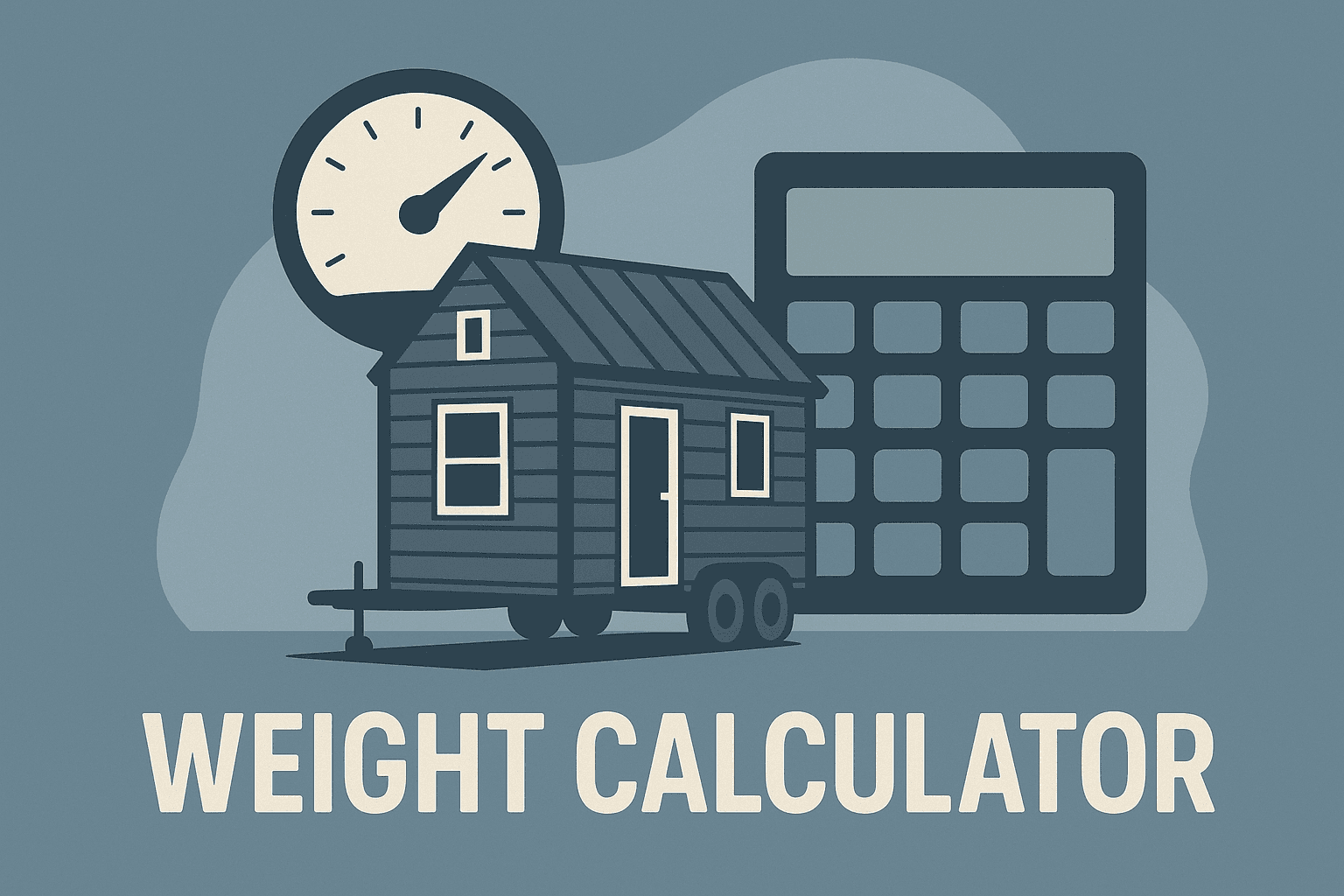Free Tiny House Weight Calculator
Estimate your tiny house's total weight based on trailer dimensions and construction materials. Plan your build to stay within towing capacity limits and ensure safe transportation. Working with a certified builder? They can help you optimize weight distribution for safer towing.
Free planning tool • Updated November 2025

Calculate Your Weight
Enter your trailer dimensions and select your construction approach to estimate total weight.
Standard road legal width is 8.5 feet (102 inches)
Most common lengths: 20, 24, and 28 feet
Based on 8.5 ft × 24 ft trailer (204 sq ft) with standard construction. Actual weight may vary by ±1,000 lbs depending on specific materials and features.
Why Weight Matters
Towing Safety
Exceeding your tow vehicle's capacity is dangerous and illegal. Proper weight calculation ensures safe braking, handling, and control during transport.
Road Legality
Most states allow up to 10,000 lbs without commercial licensing. Heavier loads require permits, commercial licenses, and may face route restrictions.
Trailer Capacity
Every trailer has a GVWR (Gross Vehicle Weight Rating). Exceeding this limit voids warranties, risks structural failure, and creates liability issues.
Foundation Compliance
If placing on permanent foundation, local codes may have weight restrictions for frost footings, soil bearing capacity, and foundation design.
Insurance Requirements
Insurance companies require accurate weight disclosure. Misrepresenting weight can void coverage and deny claims in case of accidents.
Resale Value
Buyers need accurate weight information for towing planning. Well-documented weight with scale tickets increases buyer confidence and resale value.
Weight Reduction Strategies
Choose Lightweight Materials
Metal roofing saves 500-800 lbs vs asphalt shingles. Aluminum windows save 200-300 lbs vs wood. LP SmartSide is lighter than traditional wood siding.
Potential savings: 1,000-1,500 lbs
Minimize Tile and Stone
Tile flooring, stone countertops, and brick accents add significant weight. Use vinyl plank flooring, butcher block counters, and lightweight alternatives.
Potential savings: 500-1,000 lbs
Select Compact Appliances
Apartment-size appliances weigh significantly less than full-size. Choose propane over electric when possible. Consider tankless water heaters.
Potential savings: 300-500 lbs
Optimize Loft Design
Keep loft weight minimal. Use lightweight materials for loft floors and railings. Consider sleeping platforms instead of full lofts.
Potential savings: 200-400 lbs
Reduce Built-Ins
Movable furniture is lighter and more flexible than built-in cabinetry. Use open shelving instead of heavy cabinets where possible.
Potential savings: 300-600 lbs
Frequently Asked Questions
How much does a typical tiny house weigh?
Tiny houses on wheels typically weigh 8,000-14,000 pounds. Small houses (under 200 sq ft): 8,000-10,000 lbs. Medium houses (200-300 sq ft): 10,000-12,000 lbs. Large houses (300-400 sq ft): 12,000-14,000 lbs. Weight includes trailer, framing, roofing, siding, insulation, windows, appliances, and finishes.
What is the maximum weight for a tiny house on wheels?
Maximum weight depends on trailer rating and towing capacity. Most tiny house trailers are rated for 10,000-14,000 lbs GVWR. Road legal limits typically max at 10,000 lbs without commercial licensing. Triple-axle trailers can support 15,000+ lbs but require special permits.
What factors affect tiny house weight?
Key factors: trailer size (2,000-3,000 lbs), framing material, roofing type, exterior siding, insulation, windows/doors, appliances, loft construction, interior finishes, and furniture. Using lightweight materials like metal roofing and aluminum windows can save 1,000-2,000 lbs.
What size truck do I need to tow my tiny house?
For 8,000-10,000 lbs: heavy-duty half-ton truck with towing package. For 10,000-12,000 lbs: three-quarter-ton truck (F-250, Ram 2500). For 12,000-14,000 lbs: one-ton truck (F-350, Ram 3500) required. Always verify your truck's actual towing capacity.
Important Disclaimer
This calculator provides estimates only and should not replace professional engineering calculations or certified scale weighing. Actual weight varies significantly based on specific materials, construction methods, appliances, furniture, and contents. Always weigh your completed tiny house at a certified truck scale before transport. Verify your trailer's GVWR rating, your tow vehicle's actual capacity, and comply with all applicable DOT regulations and state towing laws.